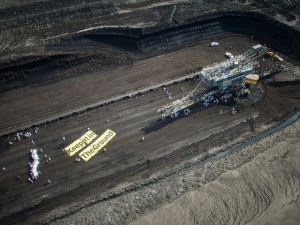Germany breaks free from fossil fuels
Laima Politajs | May 16, 2016.
Starting on May 14 the coal diggers stood still for 48 hours as a mass of activists in white overalls stepped into the bizarre lunar landscape of the lignite mine in Lusatia, Germany; Europe’s biggest opencast mine. More than 4000 people gathered to collectively participate in an act of civil disobedience.
“Stopping coal requires manual labour – and that’s what we are physically here for,” explains one of them.
Together the activists reached in a peaceful way what they did not dare to dream of in advance: Not only stopping the mining but also the production of electricity from coal; as all rails leading to the power station were occupied – climbing activists from Robin Wood dangled in hammocks above the tracks. This was the first time that Germany received all its electricity consumption from renewables and symbols a great victory for the global movement against fossil fuels.
The atmosphere was enthusiastic as people danced on the rails to the beat of samba drums, played frisbee on the sun deck of a coal digger or drove away the coldness of the nights by singing. This movement united students, teachers and farmers. Some of the older participants benefit from a treasure of experiences they gained within the anti-nuclear movement that that grew strong in Germany since the 1970s. Some describe how protesting against coal became the natural next step. People even travelled for two weeks from Sweden, England and Austria by bike to the small village of Proschim, which is currently in danger of getting torn down as the Lignite mine expands.
The mines’ owner, the Swedish-State-owned company Vattenfall wants to renew its image and plans to sell it to a Czech investor – instead of closing it down. Approval for the sale is still pending at the parliament. Many local people felt thankful for the support of the activists and participated in demonstrations across the nearby villages. For others the tradition of mining was closely intertwined with their families’ history and identity and were afraid of losing their jobs and future perspectives if one of the last remaining employers within the East-German region would disappear.
This action in Germany was part of a global wave resistance against fossil fuels. This May more than 30,000 people engaged in over 20 actions across all continents. Protestors shut down the biggest coal mine in Brazil, a Canadian port was blocked in order to stop oil exports.
Celebrity support came from Alberto Acosta, Noam Chomsky, Naomi Klein or Vandana Shiva. All of them want to spread the message to leave fossil fuels in the ground by reminding them that we are the investment risk. It will remain to be seen whether their call will be heard as the UN Climate Negotiations resume this weekend in Bonn, Germany or at the upcoming G7 and G20 Meetings.














comment